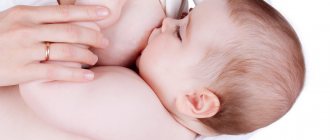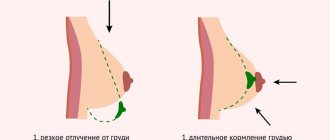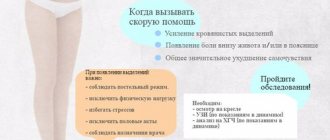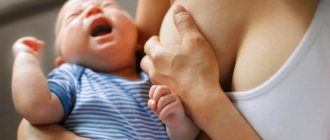In most cases, chest pain appears immediately before menstruation, and after the discharge stops, the pain goes away on its own; this is quite normal. But, if the breasts begin to hurt immediately after menstruation, then girls develop anxiety.
What this may be connected with and what danger such symptoms have, only a specialist can answer, so it is recommended to undergo an examination.
Mammary glands during menstruation
The localization of the hormone estrogen is in adipose tissue, so an increase in its amount leads to a significant increase in the volume of those organs that consist of adipose tissue. This also includes female breasts. The glands become noticeably larger, making blood flow more difficult. The result is swelling, a feeling of heaviness, and pain.
Breast pain before and during menstruation is normal. But if your breasts hurt after your period, this may indicate a disease. To avoid problems, regular breast self-examination is necessary, as well as timely consultation with a doctor.
Chest pain after menstruation or, as it is called, mastalgia, requires a mandatory examination - passing:
- ultrasound examination;
- mammography.
Only this will allow the doctor to accurately diagnose the disease and select the correct treatment.
Swollen breasts and pulling in the lower abdomen - what does this mean?
Changes in the menstrual cycle, swollen breasts, pain in the lower back and lower abdomen are typical signs of gynecological problems. A set of symptoms occurs with inflammation of the appendages, cervix, endometriosis, and vulvitis. The chest and lower abdomen hurt if a cyst has formed on the ovaries. The growth of pathological tissue interferes with blood flow, which causes a feeling of constriction.
Other factors why the stomach feels tight, the breasts swell and hurt after menstruation:
- underdevelopment, deviation from the physiological norm of the structure of the uterus;
- hypothermia;
- polycystic ovary syndrome;
- exhaustion, lack of vitamins and nutrients;
- long-term stress, depression;
- tumor formations, cysts.
Nature of pain
Normally, your breasts should not hurt after your period. If the critical days have passed, and she continues to get sick, this is a signal that abnormal processes are occurring in the body. There are several types of pain in the mammary glands, and each of them will indicate different conditions:
- cyclic pain appears on clearly designated days of the menstrual cycle; usually the mammary gland begins to ache 5-7 days before the arrival of menstruation. This occurs due to increased estrogen levels and increased body fat. As soon as menstruation occurs, this symptom ceases to bother the woman. Such painful sensations are repeated in each cycle, which explains their name. This is usually an aching pain that is felt in both glands;
- non-cyclic pain can occur on any day of the menstrual cycle, its causes are not related to monthly hormonal changes in the female body, and pain can manifest itself in only one breast;
- Acute pain is one of the normal options when the mammary gland hurts very much before menstruation, but it can also be caused by a breast injury or a cyst bursting inside the gland. To find out the exact cause, it is better to undergo an ultrasound examination. If there is mastitis, then acute pain is accompanied by fever and general weakness.
There are several other types of pain in the mammary glands:
- burning – it intensifies when touching the chest and can be projected onto the back;
- stabbing – occurs in attacks and is localized only in one of the glands;
- aching – is felt constantly, but has different intensity. With such a symptom, a woman can put off visiting a doctor for a long time, because she quickly gets used to the unpleasant sensation.
Why does the doctor ask what color the discharge is?
Discharge from the mammary glands is, in principle, not normal unless it is milk during lactation. At the appointment, the doctor is required to ask clarifying questions about the color, nature and consistency of pathological discharge from the nipples, since this is part of the differential diagnostic search.
If, when pressing on the nipple, thick, sticky brown discharge or greenish discharge appears, then the most likely cause of this condition is ectasia of the milk ducts, which occurs in women during the menopausal period.
If a woman's breasts begin to secrete fluid from light to dark shades of brown, this should suggest intraductal papilloma, which requires timely diagnosis and treatment.
If scanty purulent discharge from the nipples with an unpleasant odor is detected, which occurs during breastfeeding, mastitis should be suspected. In this case, only one breast will be bothered; local soreness may be noted in it, and the skin above the source of the inflammatory process seems to be “burning.”
IMPORTANT! If any discharge from the mammary glands appears, you should consult a specialist to identify the cause of its appearance and appropriate treatment!
When pain is normal
Normally, the breasts become full and painful before the onset of menstruation. This happens due to the increased level of estrogen, which is responsible for “childbirth”. If a woman gave birth and carried a child, her mammary glands would be ready to produce milk. But since there was no birth, the breasts fall again and become soft and painless. Therefore, the norm is soreness of the mammary glands only before or during menstruation. If your period has passed and your chest hurts, you need to go for an examination to a doctor.
Breast pain a week after period
If your breasts are sore a week after your period, this is a bad sign for most women. Since, under favorable circumstances, a week after menstruation, breast pain only occurs during pregnancy. For those women whose menstrual cycle lasts only 21 days. As a result of stress or climate change, the cycle may be disrupted and take less time than usual. Then pregnancy is possible in women with a longer period.
Usually, if your breasts hurt a week after your period, this is a symptom of the disease:
- mastitis;
- mastopathy;
- syphilis;
- oncology;
- hormonal imbalance;
- thyroid diseases;
- colds.
Sometimes a pulled pectoral muscle is included in the same list. But pain in a damaged muscle is very different from sensations directly in the mammary gland. It is usually very difficult to confuse, but it is also impossible to neglect.
Attention! Sometimes sensations similar to a pectoral muscle strain occur due to a pinched nerve in the spine.
Breast pain two weeks after period
If your mammary glands hurt 14 days after your period, a girl will have to solve the age-old philosophical question: is the glass half empty or half full? The average length of the menstrual cycle is 28 days, and the breasts swell before the period, not after it. Swelling of the mammary glands and the appearance of pain 7-14 days before the onset of menstrual bleeding is normal.
Only those who have an established menstrual cycle of 35 days should be concerned. The reasons in this case will be the same as those listed above.
Possible pathologies
If your breasts hurt even after your period ends, this is most likely a symptom of mastopathy. Mastopathy is a benign formation and does not always lead to the development of cancer. But women with mastopathy are 3 times more likely to get cancer. In addition to mastopathy, other reasons for pain in the mammary glands between menstruation may be:
Mastitis can be infectious or occur due to mechanical damage to the breast. If your breasts hurt a lot after menstruation, you should not self-medicate.
Using various methods of pain relief, a woman only pushes the problem inside.
The main causes of chest pain after menstruation
Pain in the mammary glands can be of a different nature - sharp, burning, pressing. This is caused by the accumulation of a large amount of fluid in the tissues of the mammary glands. Full, painful breasts after menstrual periods are the result of a number of reasons:
- pregnancy,
- hormonal imbalance in the body,
- tumor processes,
- mastopathy.
Are your breasts full and swollen before your period or do they appear during ovulation? This condition is understandable and is associated with a hormonal surge in a woman’s body. However, if swollen breasts persist on the 5th, 6th, 7th day of the menstrual cycle, then the woman should seek the advice of a specialist to clarify the possible cause and undergo a detailed examination.
Pregnancy
This is the most common cause of breast swelling. If menstruation has already ended, but the mammary glands remain enlarged, this means an increase in the level of the hormone estrogen in the blood. The reason for this may well be pregnancy. At first, a woman may not pay attention to this fact, associating it with recently passed “women’s” days.
Dermatological diseases
Why can the skin of my nipples get sore? Due to chronic dermatological diseases: eczema, dermatitis, psoriasis. Herpetic rashes or symptoms of candidiasis (thrush) can be localized on the chest area (especially around the nipples). These infections usually develop when the immune system is weakened. With skin diseases, the skin flakes and becomes dry, cracks, becomes covered with crusts or blisters, itches and itches.
Cardiac dysfunction and neuralgia
Often, if immediately after menstruation your chest hurts, the cause may be a neuralgic disorder or heart failure. In the first case, the spasm intensifies when trying to take a deep breath and may appear or disappear when changing body position. Pathologies of the cardiovascular system are accompanied by arrhythmia and surges in blood pressure. Sometimes the appearance of a symptom is associated with disorders in the structure of the spine.
The causes of pain in the mammary glands can be obesity, problems with the elimination of fluids, as well as the presence of addictions (smoking, drinking alcoholic beverages, caffeine, carbonated water).
Diseases of other organs
Not only diseases of the reproductive system can cause pain in the mammary gland; the following pathologies can be a possible reason for the fact that it is full:
- hormonal disorders due to problems with the thyroid gland and endocrine system;
- osteochondrosis;
- inflammation of the lymph nodes in the armpits;
- heart diseases;
- mechanical damage to the chest (compression, blows and bruises).
Wearing incorrectly selected underwear and abnormal physical activity
Such factors can provoke unpleasant consequences. The bra should not put too much pressure on the mammary glands, and the cup should not be an inappropriate, too small size.
As a result of abnormal physical activity, for example, when visiting the gym or lifting weights, it also becomes possible for pain in the chest to appear after menstruation.
Why does breast discharge appear after menstruation?
Chest pain may be accompanied by breast discharge. This phenomenon is considered normal in the middle of the cycle only in case of pregnancy. Some women may also experience fluid discharge from their nipples when pressure is applied just before their period or when they are very aroused.
A week or two after the “critical days” and with a negative pregnancy test, pain in the mammary glands and discharge from the breast is a sign of pathology that needs to be looked for and eliminated. It could be intraductal papilloma, mastitis or something else.
Hormonal imbalances in the female body
Hormones play a vital role in the process of life, so disruptions in their production leave an imprint on all processes. In the female body, hormonal changes occur very often, and against this background, chest pain may occur.
We can talk about the hormonal factor in the occurrence of such a symptom in the following cases:
- age-related changes (puberty and menopause);
- taking certain hormonal medications (in particular, we are talking about contraceptives and antidepressants);
- violation of sexual relations (or lack thereof);
- genetic factor.
In such cases, if the pain is severe, the patient may be prescribed hormonal treatment, with the help of which the estrogen level is stabilized.
What is not the norm?
Is it normal that your period has passed, but your breasts are painful? If this symptom does not depend on the menstrual cycle, this is an alarming signal. It indicates the presence of certain pathological conditions. Breast pain after menstruation can occur due to increased estrogen in the blood, and due to other negative changes in the body.
Alarm signals:
- discomfort spreads to local areas, and not to the entire chest;
- the pain is sharp or burning. It causes a lot of suffering for a woman;
- the level of pain does not change over time, but may, on the contrary, increase. If you have such symptoms, you need to consult a doctor to identify the cause of these negative changes and stop their progression, otherwise it may never end.
Pregnancy
The cause of chest pain may be pregnancy. 15% of girls experience menstruation in the first weeks of pregnancy. Sometimes symptoms that occur during implantation of the fertilized egg are mistaken for menstrual bleeding. When a fertilized egg descends into the uterus, it implants itself into the walls of the cavity.
Bleeding occurs during pregnancy if the body does not produce enough of the hormone progesterone. It may be a sign of an impending miscarriage.
During pregnancy, swelling of the mammary glands occurs. They become very sensitive and painful. Sometimes even accidentally touching the skin of the breast causes pain. The woman feels heaviness in the mammary glands, and periodically there is a sharp pain, reminiscent of a short-term deep prick with a needle. Afterwards, the unpleasant sensations may not last long.
If a week after your period your breasts begin to hurt, then you may be pregnant. The fact is that 16% of women continue to have periods after pregnancy. Typically, menstruation can occur 1-3 times, and the woman does not realize that she is pregnant.
Despite this, the body begins to actively prepare for the birth of a child. There is an increased increase in estrogen and progesterone. The breasts increase in size, swell, and prepare to produce milk.
This occurs due to an increase in the number of blood vessels in the mammary glands. Structural changes in the breasts are observed throughout pregnancy. But the pain lasts no more than three weeks.
Influence of food and drugs
It is useful to know that diet largely affects the condition of the mammary glands. Its deterioration is observed as a result of abuse of certain types of foods and after taking certain medications. These are:
- caffeine;
- methylxanthine derivatives;
- foods high in salt;
- fatty foods and dairy products;
- oral contraceptives
Caffeine and methylxanthine-based drugs have significant vasodilatory properties. They affect the vessels supplying blood to the mammary glands. This effect certainly leads to pain, swelling after the end of the menstrual cycle, and increased sensitivity.
Foods high in salt can also cause chest pain. This is due to their tendency to retain water. This feature often leads to pain in the chest and abdomen after menstruation.
Fatty foods and dairy products significantly affect the tone of the mammary glands. Due to the presence of animal fat in food, swelling and the development of pain symptoms are often observed. The mechanism of its effect has not been reliably elucidated, but there is an assumption that it is associated with the hormones of dead animals. In addition to fatty foods, dairy products can have a certain negative effect. This is due to its allergenicity.
Oral contraceptives (pills) often contain additives that lead to breast pain after menstruation.
What to do if your breasts hurt after your period?
The first thing a woman who is worried about pain in the breast area should do is contact a gynecologist. You should not take any painkillers uncontrollably and constantly, as they can only smooth out the clinical picture and eliminate symptoms, but will not affect the elimination of the root cause.
How long can you endure pain and when to contact a specialist?
If a woman is experiencing severe pain in the lower abdomen after her period has ended, she should immediately consult a doctor, especially if the pain is accompanied by the following symptoms:
- A woman notices that after the end of menstruation she has spotting that has an unpleasant odor;
- The woman has had a fever for several days, and it is practically impossible to bring the temperature down to normal values.
When to see a doctor
For women who begin to experience breast pain after menstruation, it is advisable to consult a specialist for preventive purposes, even if there are no other symptoms of pathology.
Do you want to know why your breasts hurt after your period? Then watch this video:
A mandatory visit to the doctor is carried out if:
- there are accompanying pains in the lower abdomen;
- breasts have increased significantly;
- there is discharge from the nipples;
- in the absence of menstruation, slight bleeding occurs;
- an unpleasant odor emanates from the intimate area;
- the temperature rises and persists for more than 3 days;
- The skin on the chest is very sensitive.
All of these signs can be harbingers of serious diseases that require immediate treatment. Before starting a diagnosis, a pregnancy test or hCG analysis is always done, since some examination methods are contraindicated for pregnant women.
Women should be careful about their health. Even minor changes in the mammary glands are harbingers of disorders that lead to serious complications. Regardless of age, you should not ignore it if your period has arrived and your breasts hurt
Diagnostic measures
Why do breasts not shrink after menstruation? Why are there discomforts? Only a doctor can determine the exact cause. After a survey about the nature of the pain and an external examination, an anamnesis is collected to give a general idea of mastalgia. The nature, regularity of pain, its location, and intensity are determined.
The diagnosis is clarified using the following diagnostic methods:
- palpation of the mammary glands and lymph nodes;
- mammography;
- ultrasound examination;
- tissue biopsy for suspected cancer;
- pneumocystography;
- laboratory blood test;
- ductography;
- radiography.
If pregnancy is possible, the doctor will suggest taking a blood test for hCG and undergoing an ultrasound of the uterus. Only after undergoing a full diagnosis can you determine why your breasts hurt after menstruation. In accordance with the established diagnosis, treatment is prescribed.
How to identify the causes of pain
Every woman needs to have the skills to examine her own breasts for lumps and other manifestations of disease. If you have pain after menstruation, you should examine the condition of the mammary glands yourself. Then you need to seek medical help. A mammologist, using mammography, ultrasound, biopsy and other examination methods, will reconstruct the course of the disease, explain to the patient why the pain occurred, make the correct diagnosis and select effective treatment methods.
Diseases of the mammary glands most often require treatment with anti-inflammatory or hormonal drugs. In some cases associated with the presence of neoplasms, emergency surgery is indicated.
You should remember that self-medication and taking hormonal drugs without a prescription from a specialist are inadmissible. Particular caution must be taken during pregnancy.
Mastopathy, oncology
After excluding pregnancy, mastopathy can be assumed. The second cause of discomfort in terms of prevalence. The chest hurts almost constantly, but after the menstruation has passed, the sensations intensify. The breast remains enlarged and there are lumps. The disease develops against the background of hormonal changes and is characterized by the presence of compactions of glandular tissue in the mammary gland. 60% of cases occur in women of childbearing age under 45 years of age.
A terrible disease that shocks women is breast cancer. The hereditary factor and the presence of bad habits play a big role. Most cases of the disease are associated with smoking by women from an early age.
To confirm the diagnosis, the woman will have to undergo an examination by a gynecologist, a blood test for hormone levels, and an ultrasound. Pathology can be suspected by self-examining the breast for lumps. But a doctor can make an accurate diagnosis and prescribe qualified treatment. If your period has passed and your breasts hurt, you need to go to the gynecologist. An oncological tumor detected at the initial stage of the disease is treatable.
Examination by a gynecologist and principles of treatment
The main rule of therapy is timely consultation with a doctor. The purpose depends on the cause that provoked the appearance of the symptom.
If unpleasant sensations occur regularly, experts recommend keeping records with the dates of spasm occurrence, levels of its severity, duration and accompanying symptoms. Such a diary will help reproduce the full picture of the pathological sign at a doctor’s appointment.
Usually, a trip to the gynecologist begins by asking the patient about the nature of the pain. Then the doctor palpates the mammary glands and armpits to identify unnatural deformations and seals. If there are any, the woman is sent for a mammogram or ultrasound examination, and is also asked to undergo tests.
Benign tumors are removed surgically. Single small cysts cannot be removed, but are observed. Malignant tumors undergo chemotherapy.
Mastopathy is treated with special medications in the form of tablets and hormone-containing ointments.
How to examine your breasts
Women who experience breast pain after menstruation should see a specialist. The examination is carried out in several stages:
- Initially, the breasts are examined at home;
- after palpation is performed by a specialist;
- The final stage of diagnosis is a mammogram.
Twice a year, a woman, regardless of the presence or absence of abnormalities, should visit a therapist. From the age of 35, it is recommended to undergo a mammogram once every calendar year to exclude the development of diseases that precede breast cancer. The examination makes it possible to identify any changes and their nature.
Necessary diagnostic measures
If you cannot determine the exact cause of chest pain yourself, then you should consult a doctor. Especially if alarming symptoms arise and your stomach and chest hurt after your period. These signs may indicate serious pathological problems.
To conduct a complete diagnosis, it is necessary to undergo a number of such studies:
- Mammography is a modern method of research using laser illumination of breast tissue;
- Ultrasound examination, not only the mammary glands are visible, but also the lymph nodes near them;
- ductography, this method is used as an auxiliary method; it is used to study structural changes in tissues;
- a puncture is used when a formation is detected, the contents are sent for a biopsy to determine the nature.
Breast examination by age
To prevent pathological changes in tissues, a woman should undergo a gynecological examination annually. Also, if symptoms of breast ailments occur after menstruation, it is recommended to make an appointment with a mammologist.
Basic diagnostic measures:
- Mammography.
- Pneumocystography.
- Needle biopsy.
- Ultrasonography.
- Ductography.
If, as a result of these studies, the doctor does not identify a pathology, then the discomfort has a physiological etymology. Otherwise, you need to undergo appropriate therapy.
How to conduct a self-examination of the mammary glands?
It is extremely important for every woman to perform a breast self-examination after her period, around days 7-11. This will help to identify fibrocystic mastopathy at the initial stage of development, breast cysts, and also detect tumor formations in the breast in the early stages.
The breast self-examination algorithm is as follows:
- Stand near the mirror and examine your breasts: you should look at the shape of the breasts, the color of the skin of the nipples, your arms should be lowered during the examination.
- Raise both hands behind your head and examine your chest while in this position. Determine if there is a change in the shape or size of one of the mammary glands, pay attention to the color of the skin.
- The right hand must be thrown behind the head. Then, with slow, smooth, massage circular movements, palpate the right mammary gland, paying special attention to compactions, swelling and thickening. The same steps should be repeated with the left breast.
- Using the thumb and index finger of one hand, apply gentle pressure to the base of the nipple and look for any discharge from the nipple. Do similar actions with both the left and right mammary glands.
- Take a supine position. Using circular movements, applying light pressure, you need to feel the breasts, starting from the edges of the mammary gland towards the nipples.
- Using light circular movements, you should palpate the left and right armpits, paying attention to the presence of enlarged lymph nodes. If any, you should consult a specialist.
You can cope with pain using home methods
- If your nipples are cracked and sensitive, lubricate them with baby cream or sea buckthorn oil. Panthenol is also suitable.
- Warm baths and showers are effective. Such procedures reduce the intensity of pain and have an antispasmodic effect.
- For mastitis, you can apply a softened cabbage leaf to the affected breast.
- Honey compresses are useful. You can add mumiyo, sea buckthorn oil, and aloe juice to honey.
- Take care of your breasts so as not to provoke unpleasant sensations again. And wear loose underwear.
Recommendations for all women
To avoid experiencing nipple pain after your period, follow these recommendations:
- Maintain good breast hygiene.
- Be careful when choosing a bra so that it does not squeeze or rub your nipples. Buy a bra that fits!
- Use hypoallergenic body and laundry detergents.
- Contact your gynecologist in a timely manner if your menstrual cycle is disrupted or if there are other problems with the reproductive system.
- Avoid chest injuries.
Mammologist's recommendations
Following these recommendations will help reduce discomfort or prevent its occurrence:
- Correct selection of underwear. The bra should be made of good fabrics and of high quality, be comfortable and hold the bust well without squeezing it.
- Regular sex life.
- Getting rid of bad habits.
- Daily routine and proper nutrition.
- Correct selection of hormonal contraception (the drugs should be selected by a gynecologist based on test results).
As for proper nutrition, it is recommended:
- exclude fatty, smoked, spicy, salty foods from the diet;
- include fresh vegetables and fruits in your daily diet;
- before menstruation, reduce the consumption of chocolate and coffee.
There are many reasons that cause pain and discomfort in the chest. A woman can only determine or exclude pregnancy on her own. If she is sure that there is no conception, she urgently needs to visit a mammologist.
Ways to feel better
There are several recommendations from doctors that can help reduce chest pain. These include:
- Dieting. You should exclude fatty and junk foods, eat more vegetables and fruits.
- Drink enough water. It is important to know that drinking too much often provokes strong and painful sensations in the chest.
- Eat less salt.
- You should not drink caffeinated drinks if your breasts swell after your period. Liquid is often released through the nipples - this is a sign of hormonal imbalance, in which it is especially important to monitor nutrition.
- Wear comfortable and comfortable underwear. It is better to replace a tightening bra made of artificial fabric with a loose and comfortable one.
- Exercise.
- Lead a healthy lifestyle and do not smoke tobacco products.
These recommendations will help improve your overall health even during sudden hormonal changes.
Prevention of pain
Reducing the risk of developing breast diseases and disorders that cause pain and other problems is much easier than it seems at first glance. You just need to follow simple but important rules:
- eat right, give up fatty, spicy, salty foods, include more dairy products, meat, fish in your diet
- quit smoking
- do not abuse alcoholic beverages
- organize your daily routine correctly, leaving enough time for rest
- do not exercise, avoid excessive physical activity during menstruation
- do not overexert yourself – neither emotionally nor physically
- do not expose the body to high temperature changes - overheating, hypothermia
- wear convenient, comfortable, appropriate-sized underwear that does not cause discomfort while wearing
- Regularly - once every six months - undergo examination by a gynecologist
Any deviations from the norm, be it pain in the mammary glands, discharge from the nipples, pulling, unpleasant, painful sensations in the lower abdomen in the middle of the menstrual cycle - all this is a serious reason for immediately contacting a gynecologist. Only a correct diagnosis and timely treatment will help avoid dangerous and unpleasant consequences.











